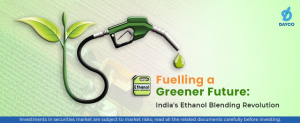Is Ethanol Blending Indias Answer to the Energy Crisis
![]() June 17, 2023
June 17, 2023
![]() 0 Comments
0 Comments
In 1932, economist Lionel Marshall identified one major economic problem - “resources are limited, but wants are unlimited.” With the world fighting a depleting natural resource crisis, these words have become a reality today. In the joint battle against the energy crisis, the Government of India is successfully contributing to energy independence and reducing the country’s reliance on fossil fuels. The path towards a greener and sustainable future is being fueled by ethanol blending, a technique that combines environment-friendly additives like ethanol with gasoline.
Ethanol Blending: The Chemistry Behind It
As the name suggests, ethanol blending is a process of blending ethanol with gasoline or petrol to be used as a renewable bio-fuel-based motor fuel. Ethanol (Ethyl Alcohol or C2H5OH) is primarily produced from sugarcane molasses in the fermentation process in India. Unlike fossil fuels, ethanol is derived from plants that harness the power of the sun, making it a renewable fuel. Several blends of this bio-fuel ethanol with gasoline are formulated. The oxygen in the ethanol molecule allows the engine to combust the fuel completely, thereby producing fewer emissions and reducing pollution.
India’s Drive to Ethanol Blending: The Roadmap and Journey so far
The Government of India has implemented the Ethanol Blended Petrol (EBP) Programme in the country except in the union territories of Andaman Nicobar and Lakshadweep Islands. This programme paves the path for the country to achieve a blending of 20% of ethanol in petrol by 2025.
Since 2014, the Government has taken various actions to drive up domestic ethanol production, such as reinstating the administrative pricing system for ethanol and reducing the GST applicable for the EBP programme from 18% to 5%. An interest subvention scheme for the Department of Food and Public Distribution (DFPD) was implemented to expand ethanol production, along with a long-term ethanol purchase policy.
The report titled “Expert Committee on Roadmap for Etanol Blending in India by 2025”, released in June 2021, outlined a plan for the eventual rollout of 20% ethanol blended with petrol. The roadmap contained the following landmarks:
- Increasing ethanol production capacity from 700 crore litres to 1500 crore litres across India
- E10 (10% ethanol blending) fuel to be phased out by April 2022
- E20 (20% ethanol blending) material-complaint and E10 engine-tuned vehicles be introduced from April 2023
- A phased rollout out of E20 fuel from April 2023 which will be made available by April 2025
- Production of E20-tuned engine for vehicles from April 2025
- Encouraging the use of water-sparing crops in addition to sugarcane molasses, like maize, as inputs to production.
- Exploring technology that helps produce ethanol from the non-food feedstock.
Ethanol Blending in India: Current Scenario
The Indian Government expresses confidence that the country will be able to achieve the target of blending 20% ethanol with petrol by 2025-26. Ethanol is expressed as a sunrise sector, and the industry is in works to set up manufacturing units that can operate on dual feedstock, sugarcane and foodgrains like maize and rice/wheat unfit for human consumption. This is due to the shortage of sugarcane, as increasing further supply would compromise food crops.
India has achieved its 10% ethanol blending target. Ethanol blending increased to 10.5% in 2021-22 from just 1.53% in 2013-14, a result of favourable Government policies and efforts of the industry and farmers. The supply of ethanol to oil marketing companies (OMCs) has increased from 38 crore litres in 2013-14 to 408 crore litres in 2021-22.
The only foreseeable way to jump to 20% blending is if the maize crop plays the protagonist. Maize has reasonably less water content and hence is better for ethanol production. It is estimated that of the 1300 crore litres of ethanol requirement, 650 litres should hail from sugarcane while the remaining from maize and other food grains. Maize production will have to be increased to 43 million tonnes from the current 34 million tonnes.
Ethanol Industry in India: Major Players
Ethanol is principally a by-product of the sugar industry in India. Therefore, the top sugar manufacturers in India are also the top ethanol producers. The major players in the ethanol industry are:
- Bajaj Hindustan Sugar Limited (Mumbai): Initiated ethanol manufacturing in India in 1944 and currently has a capacity of 1,36,000 TCD (tons of cane per day) and distillation capacity of 8,00,000 litres/day.
- Balrampur Chini Mills Limited (Kolkata): TCD capacity 76,500 and 5,20,000 litres/day distillation capacity.
- Dalmia Bharat Sugar and Industries Limited (Uttar Pradesh): Ethanol distillation capacity 3,05,000 litres/day, TCD 35,000.
- Shree Renuka Sugars Limited (Karnataka): TCD 35,000, ethanol distillation capacity 9,30,000 litres/day.
- Triveni Group (Uttar Pradesh): Ethanol distillation capacity 6,60,000 litres/day.
In addition, Praj Industries is constructing the first second-gen ethanol plant for Indian Oil at Panipath. The MoU signed states the production of other biofuels like CBG and biodiesel in this facility as well.
How will India Benefit from Ethanol Blending?
Firstly, as already established, ethanol is a biofuel. It reduces the reliance on fossil fuels and lowers greenhouse gas emissions. The octane content in ethanol is higher than in petrol, improving the fuel blend’s performance. Therefore, it offers greater efficiency at lower costs than petrol. The use of the E20 blend would reduce carbon monoxide emissions by 50% for 2-wheelers and by 30% for 4-wheelers.
In terms of oil consumption and imports, India ranks third in the world. It is essential for the country to reduce its dependence on imports, as it currently imports 82% of its crude oil. In the economic sense, ethanol blending would reduce India’s crude oil bill by Rs. 50,000 crores annually, saving massive amounts of foreign exchange.
It is immensely beneficial to farmers as they can make extra money by planting crops used in ethanol manufacturing. The ethanol industry is attracting lucrative investments, boosting the industry and aiding job creation.
In the last Budget too, finance minister Nirmala Sitaraman said, “Green Growth” is currently our prime focus. “We are implementing many programs for green fuel, green energy, green farming, green mobility, green buildings, and green equipment. And policies for efficient use of energy across various economic sectors,” she said.
Since ethanol blended petrol is priced cheaper than petrol now, the cash crunch will expectedly be less felt at the petrol pumps.
If you have a question, share it in the comments below or DM us or call us – +91 9051052222. We’ll be happy to answer it.
Share With
I'm a cool paragraph that lives inside of an even cooler modal. Wins!
Are you sure?
In case you didnt know, you can open your account online within 24 hours. Offline account opening takes up to 4 working days. If you wish to open your account offline, fill and sign the forms using a black/blue ballpoint pen. Please fill in the email and mobile number of the applicant to avoid account opening delays.
Enter Password
Please enter your details and password
New to Dayco?
Enter Password
Please enter your details and password
New to Dayco?
Filing Complaints on SCORES (SEBI) – Easy & Quick
- Register on SCORES Portal (SEBI)
- Mandatory details for filing complaints on SCORES:
- Name, PAN, Address, Mobile Number, E-mail ID
- Benifits:
- Effective Communication
- Speedy redressal of the grievances
Thanks !!
Your details were successfully received.

Thank you for Your Feedback!
Our Team is working constantly on improving our user experience and your feedback really means a lot.
Thanks !!
App Link Send to your mobile number successfully.
Thank You
All your Questions have been recorded
Thank You
All your Questions have been recorded
Thank You!
Thank you for your response. We'll get in touch with you at the earlisest for your investment planning needs
NEXT
Thank You!
Thank You for your interest in our Moderate Equity Portfolio. Please find below the credentials to track this portfolio:
User ID: mockmod@daycoindia.com
Password: abcd@1234
Portfolio Tracker
Please Read!
Risk profiling is crucial for identifying and managing potential risks in investment decisions. Please carry out your risk profiling before making any investment decisions.
Complete Risk Assessment Now
Thank You !!
Please enter your details to download/print the report
Thank You !!
Please enter your details to download/print the report
Thank You !!
Please enter your details to download/print the report
Thank You !!
Please enter your details to download/print the report
Thank You !!
Please enter your details to download/print the report
Set Your Goal
Please Select an option from below
Set Your Goal
Please Select an option from below
Thanks You !
We appreciate your interest in our services. Our team will be in touch with you shortly.
CloseSet your Goal
Please enter your details in the fields provided
Thanks You!!
Calculation report has been sent to your mail id successfully
Clear form?
This will remove your answers from all questions and cannot be undone.



 Book Appointment
Book Appointment









Leave a Reply